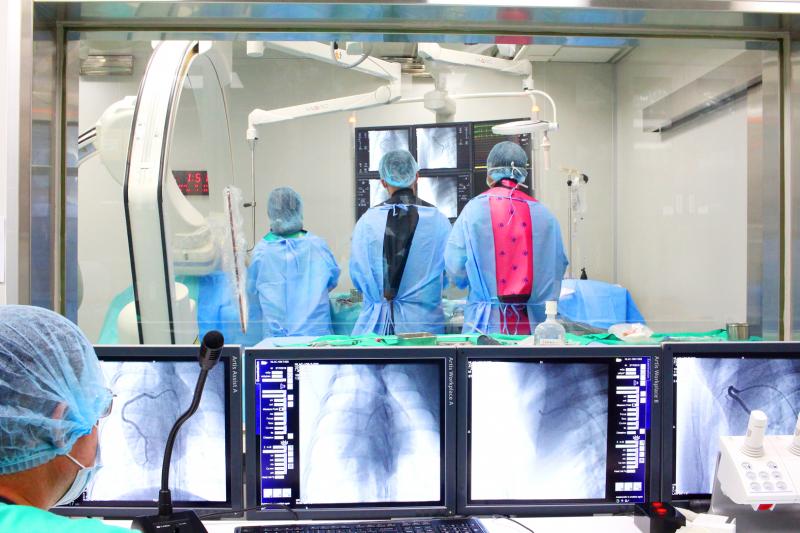A blood vessel imaging system installed at the National Laboratory Animal Center could help researchers develop a treatment for cardiovascular disease in humans, the center said yesterday.
The center, based at the National Biotechnology Research Park in Taipei’s Nangang District (南港), is one of the National Applied Research Laboratories’ (NARL) eight centers.
Center director Yu Chun-Keung (余俊強) and Hung Kuan-yu (洪冠予), the superintendent of National Taiwan University Hospital’s Hsinchu Branch, yesterday signed a memorandum of understanding (MOU) at a ceremony in Taipei, with NARL president Wang Yeong-her (王永和) serving as a witness.

Photo courtesy of the National Laboratory Animal Center
Cooperation between the two institutions would speed up the clinical application of innovative techniques developed by the hospital, while NARL offers other research resources related to semiconductor, information and communications technologies, Wang said.
Demand for oncological, cardiovascular and neurological testing for animals has been increasing, so the center last year spent NT$30 million (US$989,576) installing a biplane angiography system in its laboratory at the Hsinchu Biomedical Science Park, center associate research fellow Su Yu-chia (蘇裕家) said.
The system can provide 3D X-ray images of animals in real time, which enables veterinarians to see the structures of animal organs while performing surgery and increases the success rate of the surgeries, he said.
Techniques such as computed tomography and magnetic resonance imaging also produce 3D images, but they do not allow surgeons to take images during surgery, Su said.
The MOU would allow physicians at the hospital who want to develop new treatments for cardiovascular disease in humans to use the center’s imaging system to first try the treatments on laboratory animals, he said.
The institutions would jointly develop innovative medical techniques, such as navigating inside bronchial tubes, treating various heart arrhythmias and diagnosing intracerebral hemorrhages, he said.
They would share data from certain experiments that employed the imaging system, Su said, adding that the biplane angiography system could be rented by researchers at other institutions.
The center, whose headquarters is in Taipei, has a preclinical testing lab at the Hsinchu Biomedical Science Park, as well as a preclinical animal care and surgery facility at the Southern Taiwan Science Park (南部科學工業園區) in Tainan.

INVESTIGATION: The case is the latest instance of a DPP figure being implicated in an espionage network accused of allegedly leaking information to Chinese intelligence Democratic Progressive Party (DPP) member Ho Jen-chieh (何仁傑) was detained and held incommunicado yesterday on suspicion of spying for China during his tenure as assistant to then-minister of foreign affairs Joseph Wu (吳釗燮). The Taipei District Prosecutors’ Office said Ho was implicated during its investigation into alleged spying activities by former Presidential Office consultant Wu Shang-yu (吳尚雨). Prosecutors said there is reason to believe Ho breached the National Security Act (國家安全法) by leaking classified Ministry of Foreign Affairs information to Chinese intelligence. Following interrogation, prosecutors petitioned the Taipei District Court to detain Ho, citing concerns over potential collusion or tampering of evidence. The

‘FORM OF PROTEST’: The German Institute Taipei said it was ‘shocked’ to see Nazi symbolism used in connection with political aims as it condemned the incident Sung Chien-liang (宋建樑), who led efforts to recall Democratic Progressive Party (DPP) Legislator Lee Kun-cheng (李坤城), was released on bail of NT$80,000 yesterday amid an outcry over a Nazi armband he wore to questioning the night before. Sung arrived at the New Taipei City District Prosecutors’ Office for questioning in a recall petition forgery case on Tuesday night wearing a red armband bearing a swastika, carrying a copy of Adolf Hitler’s Mein Kampf and giving a Nazi salute. Sung left the building at 1:15am without the armband and apparently covering the book with a coat. This is a serious international scandal and Chinese

Seventy percent of middle and elementary schools now conduct English classes entirely in English, the Ministry of Education said, as it encourages schools nationwide to adopt this practice Minister of Education (MOE) Cheng Ying-yao (鄭英耀) is scheduled to present a report on the government’s bilingual education policy to the Legislative Yuan’s Education and Culture Committee today. The report would outline strategies aimed at expanding access to education, reducing regional disparities and improving talent cultivation. Implementation of bilingual education policies has varied across local governments, occasionally drawing public criticism. For example, some schools have required teachers of non-English subjects to pass English proficiency

TRADE: The premier pledged safeguards on ‘Made in Taiwan’ labeling, anti-dumping measures and stricter export controls to strengthen its position in trade talks Products labeled “made in Taiwan” must be genuinely made in Taiwan, Premier Cho Jung-tai (卓榮泰) said yesterday, vowing to enforce strict safeguards against “origin laundering” and initiate anti-dumping investigations to prevent China dumping its products in Taiwan. Cho made the remarks in a discussion session with representatives from industries in Kaohsiung. In response to the US government’s recent announcement of “reciprocal” tariffs on its trading partners, President William Lai (賴清德) and Cho last week began a series of consultations with industry leaders nationwide to gather feedback and address concerns. Taiwanese and US officials held a videoconference on Friday evening to discuss the